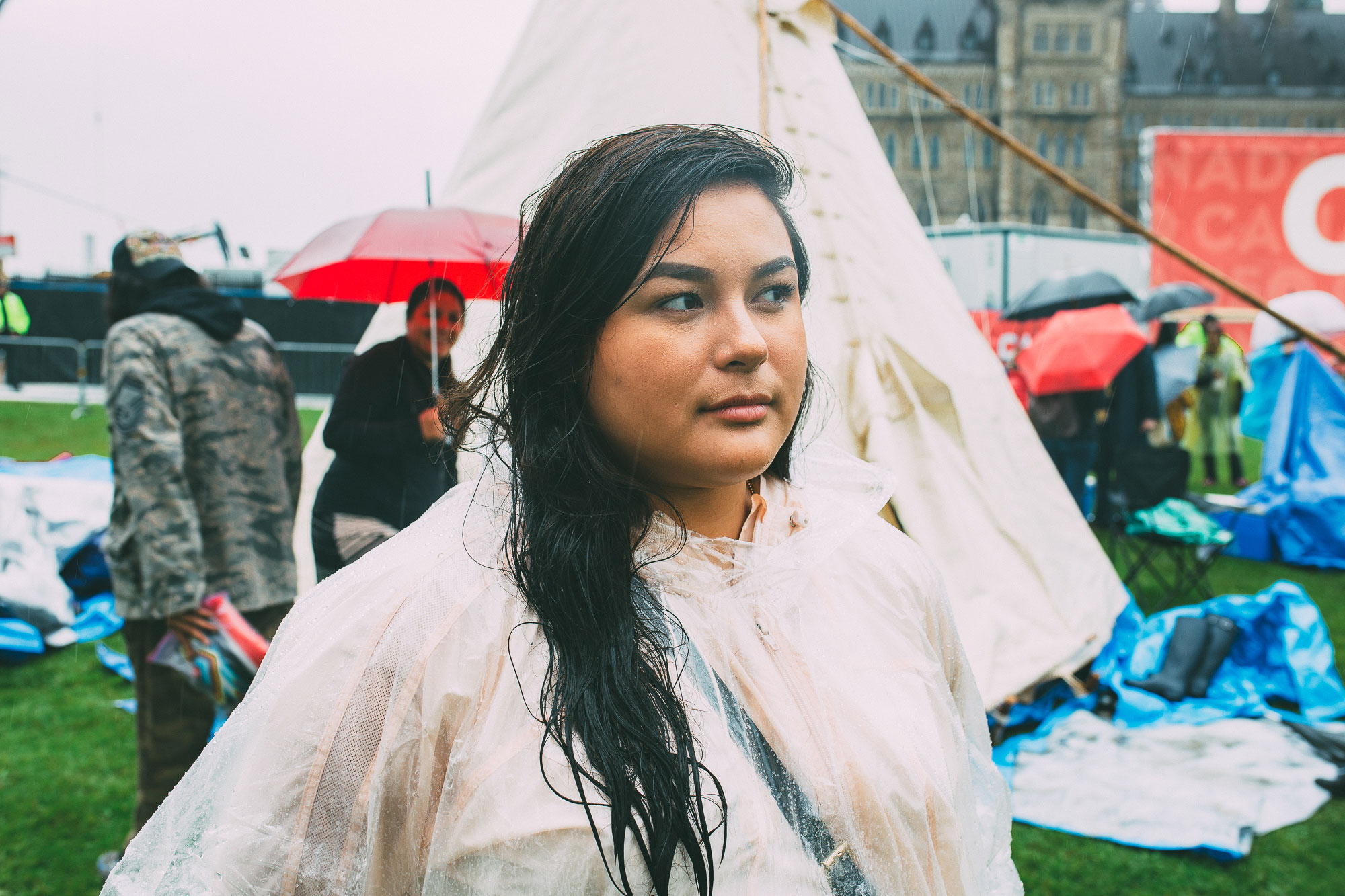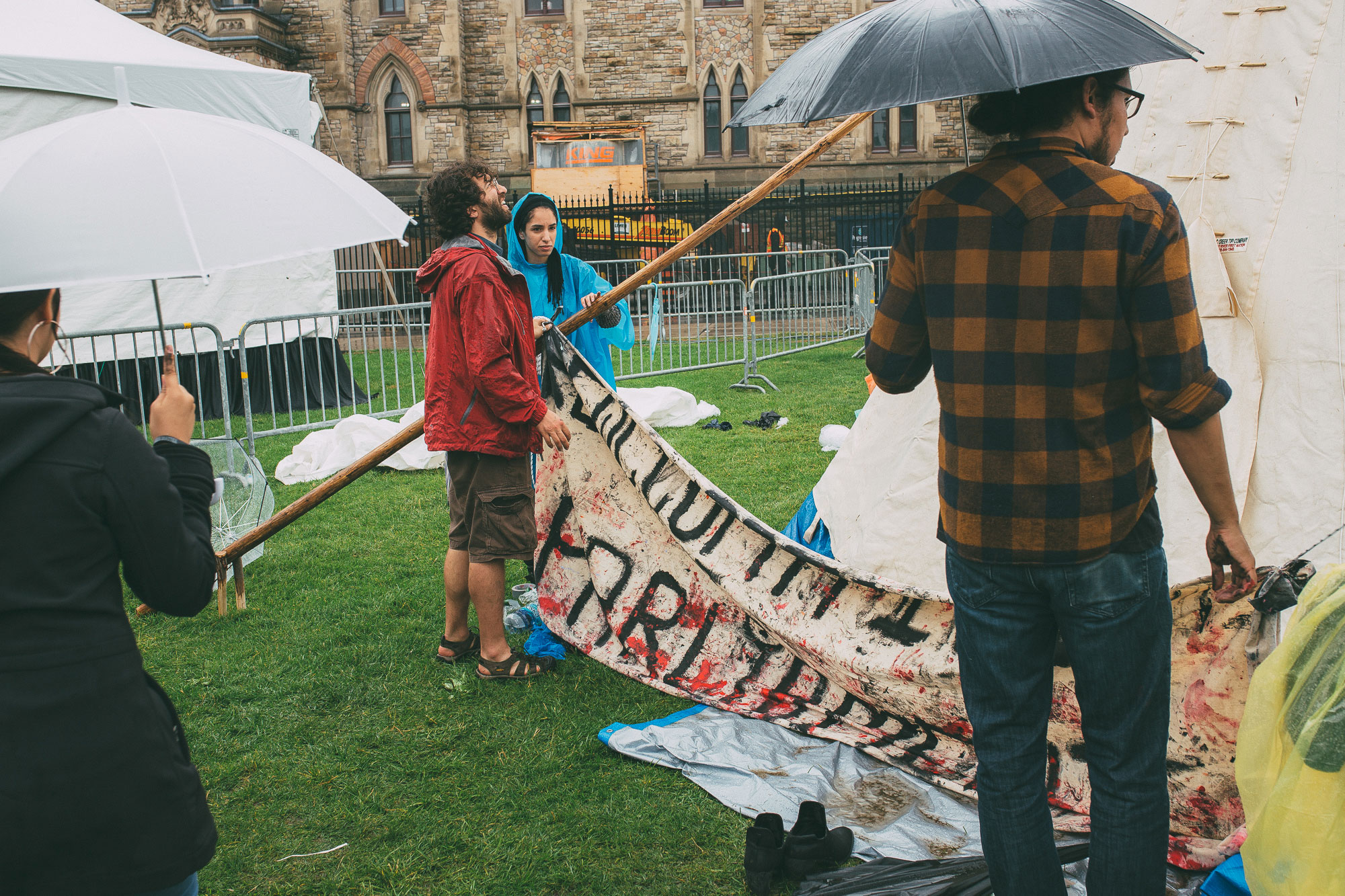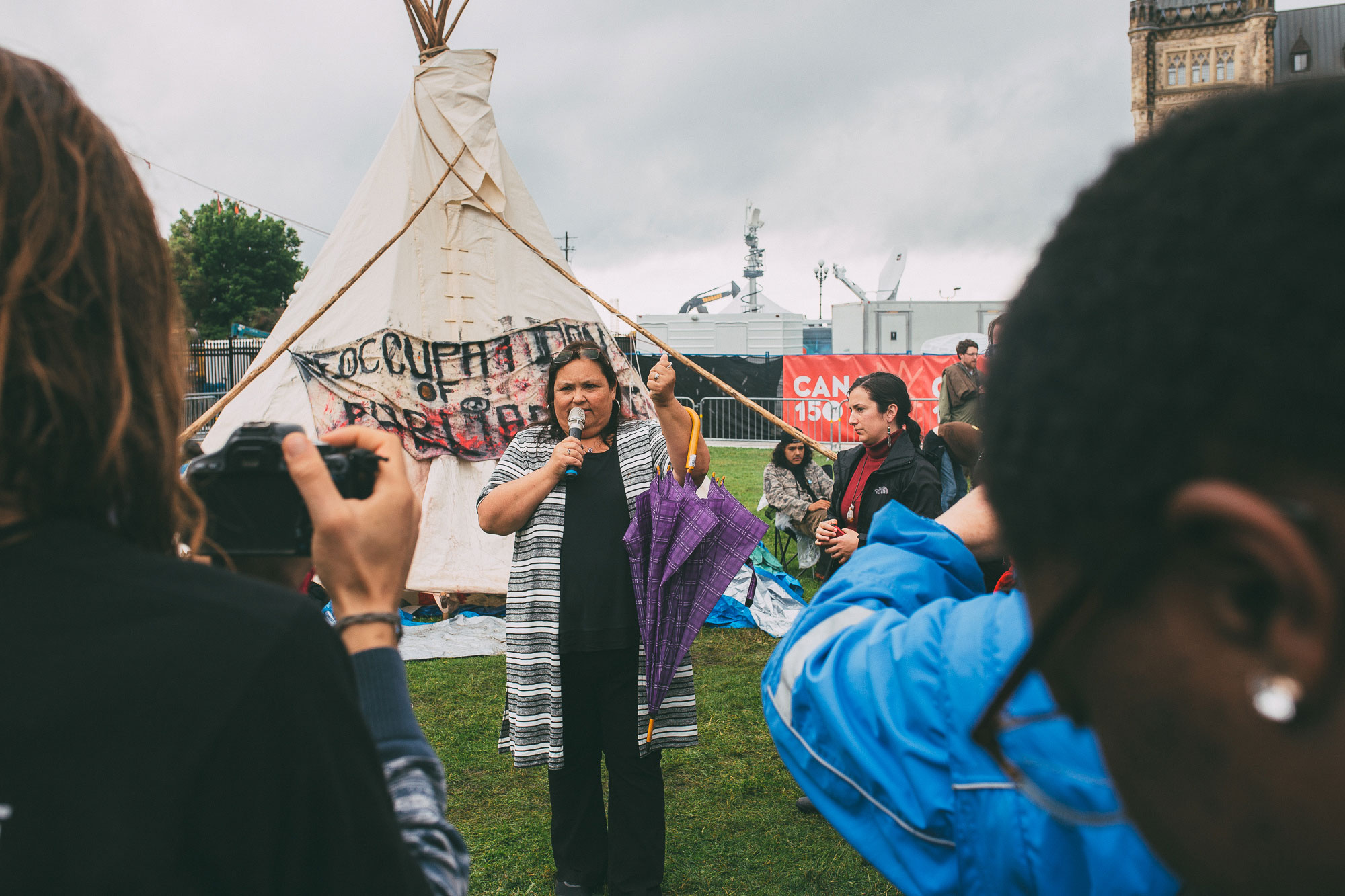“My name is Shaylynn Marsden. I’m from Beausoleil First Nation, otherwise known as Christian Island or Chimnissing in the language.”
When she was telling me where she was from, Shaylynn explained that Beausoleil was connected to Georgina Island and Rama as part of the M’njikaning, the Anishinaabe in the northern part of Lake Simcoe. Her people had moved to Christian Island in the 1830s after being forced to relocate following the failure of the Coldwater Experiment, a governmental program of relocation and assimilation in the 1830s that ‘failed’ because the ‘Indians’ were too prosperous and weren’t being forced to abandon their traditions.
I had several impactful conversations with Shaylynn; this is part of just one. Throughout the recording you can hear raindrops hitting my phone because we recorded it on Parliament Hill between grandstand sound checks and bouts of heavy rain. Within an hour of this conversation the two of us were standing between a dozen RCMP officers and the Reoccupation tipi.
“I’m here in Ottawa representing my community, my people, here at the tipi, supporting the movement against Canada 150. It’s about Indigenous resistance and about the truth behind this celebration. It’s 150 years of genocide of our people, colonization, assimilation, broken treaties.”
“So I feel very honoured,” she continued, “not only as an Anishinaabekwe Indigenous woman but also as an Indigenous youth to be here right now. I’m glad that I’m here right now in this moment, supporting my people. I feel very strong and empowered and just at home here, even though my home is eight hours away from here, I feel really connected with everyone that’s here. We’re all here for the same reasons, we’re taking a stand for our people.”

Parliament Hill was, as Shaylynn said, a moment. Her dedication to supporting her people, however, has grown for years and has spanned generations. She has been or is involved in treaty research, land claims, child welfare, criminal justice and youth rehabilitation. I felt like at the core of her young spirit was resistance, and I heard stories of how that resistance took the shape of healing.
“I’m currently a family wellness partner with a Native organization called Mahmawi-Atoskiwin, working with Indigenous families that are in and coming out of the child welfare system. I just recently graduated with my Bachelor of Arts in criminal justice and I have plans to go on to law school.”
“My passion has always been criminal law because our people are overrepresented in the justice system. They say that the correctional facilities are the new residential schools, because our people make up only 4% of the general Canadian population and we make up more than 25% in both provincial and federal correctional institutions. My life experience and stuff that I faced when I was younger is kind of what fueled the fire for me to pursue that route.”
“I also volunteer with the Calgary Young Offender Centre, working with Indigenous offenders. I just go and visit them for one or two hours a night each week and we play cards or have a conversation, just kind of be there for them and help fill that void. A lot of them were in the child welfare system, a lot of them, like me, are products of intergenerational trauma from the Indian residential schools. I just want them to know that if I can make it out of that, then they can too.”
Shaylynn has this ability to connect the dots between history and present, between land acquisition and reserves and residential schooling, between abuse and trauma and identity. For her, Indigenous incarceration rates are not disconnected from broken families. Broken families are not disconnected from residential schooling. It might sound obvious, but to be able to put those pieces together while in the midst of all those pieces themselves, and to be actively working to fix them, that’s something. That’s Shaylynn.
She’s withstood those pieces herself. “I’m a suicide survivor. I was sexually abused when I was a teenager. I witnessed a lot of suicide, substance abuse and violence on my reserve and in the city of Calgary. So I just try and carry those reasons and just remind myself why I’m doing what I’m doing so that others have hope.”
“No one was there for me when I needed it, so I want to be there for others so that they know that they can make it.”
The day before I recorded this conversation, Shaylynn was describing the pain her family and her community had endured, and how that trauma had reached her childhood and still affected her today. I had tears blurring my vision, but her eyes were clear and her voice was steady. “It ends with me,” she said.
“I broke the cycle.”
I found that to be one of the most moving things I had ever heard, particularly because of her usage of past tense. Healing is, of course, a process, as is managing mental health and family resilience; but still, within her language and her experience, the cycle of trauma was broken. It was done. It was not going beyond her.
I asked her during the recording how she came to make that change, and she responded by describing her culture. “I guess just remembering where I come from, my roots, my home, the land where I’m from. Being an Indigenous woman and having that connection to the land and the Creator, and just remembering that being a woman I’m very powerful. In our culture we regard women as very powerful because we’re the life-givers. We take care of the men and the children and the villages and everything.”
She didn’t have that sense of power and identity when she was younger, a result of internalized colonialism. “We kind of lost that with colonization,” she pointed out, “with patriarchy, because we used to have a matriarchal system back then.” Reclaiming her identity, then, was an act of decolonization, and it was based on reconnecting with who she was as an Anishinaabekwe.
“Just remembering who I am as a person and using my culture and spirituality to help myself heal. Because I was lost. I was actually ashamed to be First Nations, but that’s basically what saved me, smudging and praying and going to ceremonies, and just being around my people, listening to stories from the Elders. Without that I probably wouldn’t be here today. That’s what brought me back to life.”


When the recording was done, there was so much water on my screen that I couldn’t stop the recording, so I asked Shaylynn if there was any message she would share if she could. Without hesitating, she said yes.
“I just want to say that you’re not alone, especially on this journey, you feel like you’re alone. For me, when I was going through my anxiety and depression at first I felt like I was alone. Then when I had my breakdown and my attempt and had all the support afterwards, I realized that I’m not the only person that experiences this and suffers from it. If you need help don’t be afraid to ask, because there are people out there that are willing to lend you a hand and be a mentor.”
“Just know that you’re not alone and there’s people that are willing to help you. I think that it’s important that we all support one another and encourage one another because we’re all in it together.”
It was like she was speaking to her younger self, and to some extent, she was. It made me think of the We Matter Campaign, a national campaign to bring messages of hope and resilience to Indigenous youth struggling with suicidal thoughts and other hardships. I visited their website again in the writing of this article and found a spoken word poem by Helen Knott that echoed what Shaylynn said.
Let traditions and ceremony be your medicine
Let the ancient tongues of your grandmothers be your lullaby
Let prayers be the wings that give you flight
Let not another life be stolen
Not another loss to suicide
Not now
[…]
I know this sounds cliché
But things won’t always be this way
It might seem like a strain right now
But one day I promise you’ll be standing proud
Know that your skin is the most beautiful shade of brown
And you are still a warrior
But battles are now fought on different grounds
I have no doubt in my mind that Shaylynn is a warrior, nor do I have any doubt that she has already and is going to do impactful things for her community and for the Indigenous youth to whom she is a care-giver, a defender and a role model. Standing at her side was worth standing in the rain.